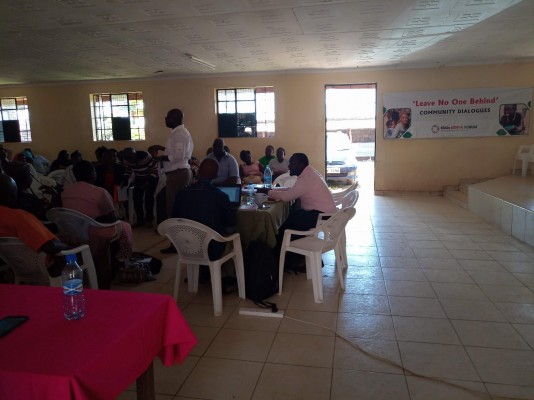Community Dialogues
Date: Aug 20th, 2019

Introduction:
The community dialogues provide a strong, coordinated and accountable forums that included voices of marginalized communities including women, youths, poor in slums, person with disabilities and elderly to be integral component in monitoring and implementation of the SDGs. This fosters an increased social accountability of key stakeholders to trigger responsive action for a more inclusive and equitable society thus enhancing realization of SDGs.
Inclusion and community engagement of marginalized group is critical in SDG discussions. The dialogues are an intriguing process that help magnify the marginalized voices in the implementation of SDGs. They help identify critical gaps in government service delivery including mismatch of citizen priorities, plans and actions in the design of service delivery interventions.
Public participation of marginalized groups in Kenya is considered a crucial pillar of the Kenyan Constitution. It promotes democracy and inclusivity by providing the public with the opportunity to take part in decision-making processes in government. Participation of marginalized group in Kenya is especially important in the budget process and the legislative process. Other areas where participation of marginalized groups in Kenya should take place include the public procurement and tendering process. The Kenyan Constitution is supplemented by other Acts of Parliament. All these form the legal framework for inclusive public participation and development in Kenya.
However, exclusion and marginalization of vulnerable group in Kenya is still a challenge. This has continued to create inequalities in various spectrum including education, economic, employment and social life. This goes against the principle of SDG that seek to ensure that there is no one left behind. Reducing exclusion and marginalization of vulnerable groups will result in a more equitable, inclusive and sustainable society. This is in line with Kenya’s vision 2030, Agenda 4 and sustainable development goals.
Figure: Community Dialogue, Busia
The community dialogues seek to reverse exclusion and marginalization of vulnerable in Kenya. The level of marginalization has been perpetuated by cultural biasness, historical injustice, political partiality, poor value system and lack of inclusive legislative frameworks. It gives voice and agency to marginalise groups and communities within SDG implementation and monitoring processes.
The dialogues are also geared towards presenting opportunity to ordinary citizens in the County to contribute in the SDGs process at the community/county level by airing their views about the goals. The community dialogues aim to reach out to communities at the grass roots level in Kenya for increased awareness on the SDGs. The community dialogues have so far been carried out in three phases. Phase one occurred in 2016-2017, while the second phase was carried out in 2018-2019, and covered five and six counties respectively. The third phase of the dialogues was carried out in 2019 and covered three counties.
Objectives
The objectives of the community dialogues are:
- To create awareness and share information with Communities about the SDGs especially how they apply to their daily lives;
- To create awareness in the communities about their roles as citizens in the implementation of the SDGs at the local level
- To initiate self-motivated planning for community actions for accelerated achievement of implementation of the SDGs at the local level.
SDGs Kenya Forum implementing Partner in Kenya
The SDGs Kenya Forum is a platform resulting from a transition process by Civil Society Organizations (CSOs) who came together in 2013 as the Kenya CSOs Reference Group on Post 2015. The platform bringing together over 300 diverse civil society organizations (CSOs) seeking to contribute to the implementation of the 2030 Agenda for sustainable development (SDGs). Panafric Climate Justice Alliance is a member of the SDGs Kenya Forum and approached the Forum to lead implementation of the work in Kenya.
The Forum is targeting all 47 counties at a subnational level. The project also seeks to mobilize different stakeholders at national level. The dialogues are conducted in a participatory way, allowing every participant to express their understanding of the SDGs and what they think are the underlying issues that may hamper achievement of the goals or even accelerate the pace.
We draw participation from:
- Community Based Organizations
- Community Health Workers and Social workers
- Social justice advocacy groups
- Community elders
- Gender equality advocacy groups
- Environmental groups
- Youth Groups
- Women Groups
- PWD
- County government officials
Dialogue Structure
The dialogues are organized in the following structure:
- The SDGs and what they mean to every Kenyan
- Key structures, processes and stakeholders in the SDGs implementation at the community level
- Citizen participation in the SDGs implementation processes at the community level
- Community action for the SDGs going forward
